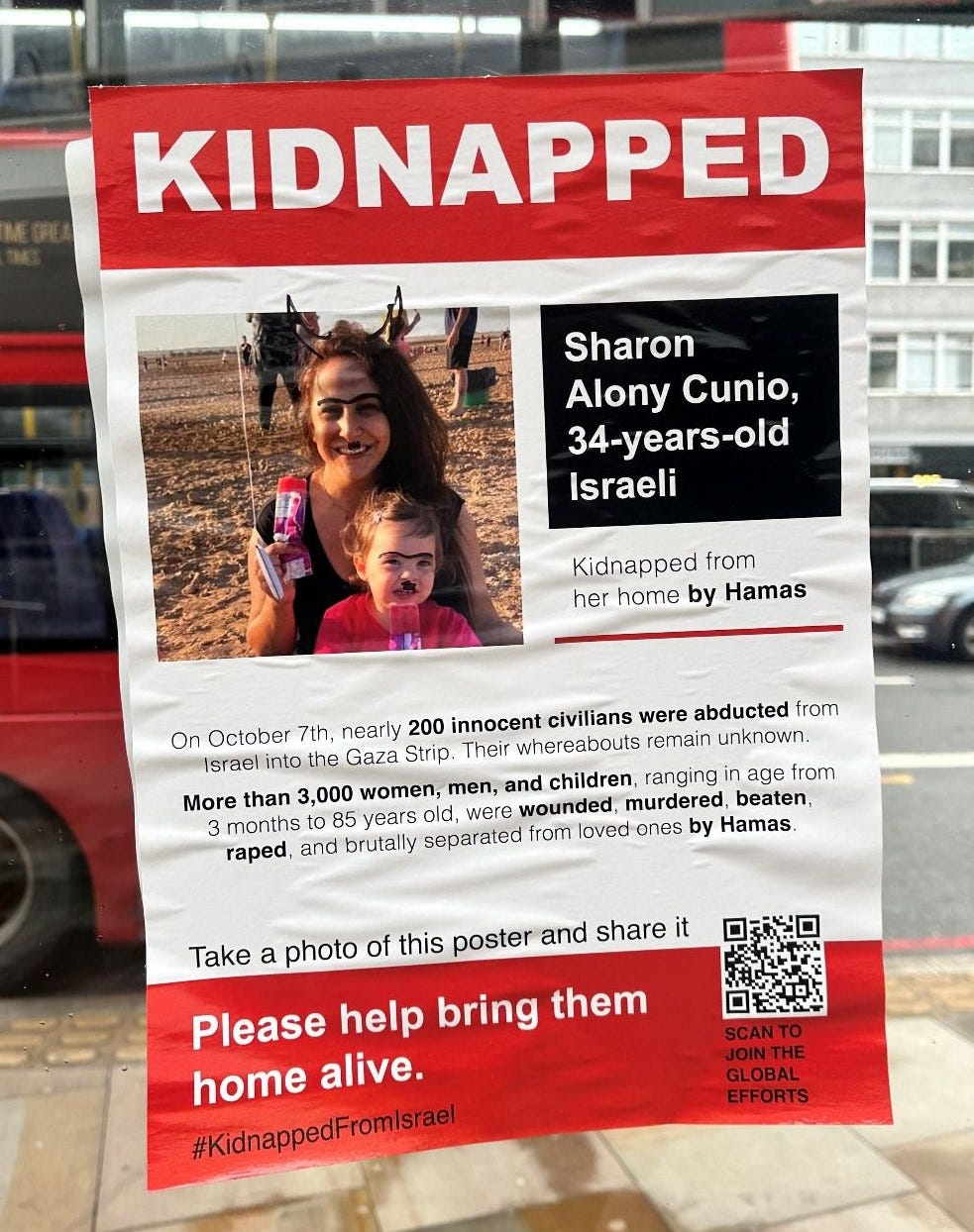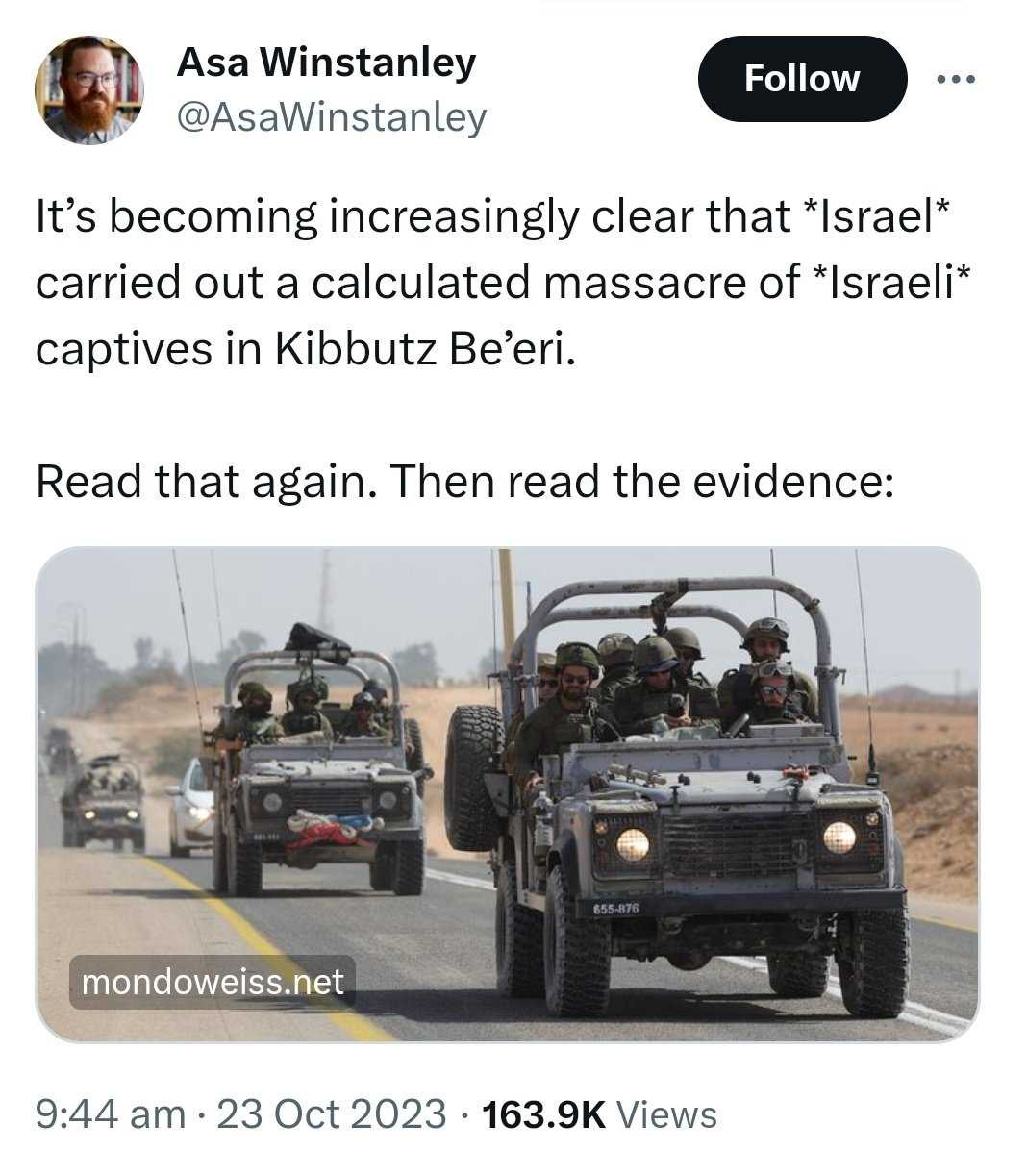It seems minor in the scheme of things, but amongst the most shocking elements to happen since the terror attack in Israel on 7 October, on top of the horrendous loss of life, the depravity of Hamas’s barbarism, the renewed suffering and destruction in Gaza, the wearily predictable wave of anti-Jewish hate crime, the sense of a world order spiralling out of control and into war upon war – it is the people ripping down posters of Israeli hostages who have come to symbolise our loss of shared humanity.
These posters have gone up all over cities in Britain, France, the United States, Australia and probably other countries too. It’s hard to walk around central London without spotting one. They all follow the same design: a red border, a photograph of a young child, an old couple, a family – ordinary people photographed doing ordinary things in ordinary clothes – their names, ages, and the word “KIDNAPPED” emblazoned across the top.
And as quickly as they have gone up, people have started to tear them down or deface them. This is no street clean up operation: it’s targeted hate. You’ve probably seen the videos. Men and women, usually young, physically assaulting all those mute, smiling images of lost Jews, with an expression of gleeful defiance at their act.
This is happening miles from any conflict zone. It is non-violent, utterly trivial really, yet it has proven to be one of the most upsetting aspects of the current crisis. Some of the hostages in Gaza are children. The youngest is just nine months old. Almost all are civilians. There is no question that taking and holding them was a crime; nor is there any doubt that they and their families must be terrified beyond description. In many cases, they witnessed family members being murdered in front of them by the very same people now holding them hostage. Even in the polarised atmosphere of reactions to the Israel-Palestine conflict, with all the taking of sides and echo chambers and clashing narratives, to withhold any sympathy for them at all, to attempt to erase their very existence from public consciousness, suggests a degree of heartlessness and a complete failure of compassion for the other that is chilling.
I think there are three reasons why people do this, and they are emblematic of the three ways in which supporters of the Palestinians have reacted more generally to the unashamed terror of the Hamas pogrom: celebration, denial, and justification.
Let’s deal with the celebrators first. Some of the people defacing these posters are plainly and proudly antisemitic. It doesn’t take complex psychological or political analysis to work out why someone drew Hitler moustaches and horns on the faces of hostages on a set of posters on Finchley Road in north London. Just to ram the point home, where the posters read “Kidnapped from his home by Hamas”, the defacer crossed out “Hamas” and changed it to “Kidnapped from his home BY REAL MEN”. With some irony, this occurred just a few hundred yards from where, two years ago during a previous conflict, a convoy of cars festooned with Palestinian flags drove through as one of their number shouted “Fuck the Jews, rape their women, rape their daughters” out of the car window. I guess he got his wish.
When the Israeli army invited foreign journalists to a macabre private screening of Hamas’s self-filmed footage of their own terrorist atrocity, which had been livestreamed or posted on Hamas’s own social media channels, I wondered whether this was necessary. But then I read about the woman in Primrose Hill who said she was taking down hostage posters because she didn’t believe Hamas had kidnapped anyone at all. Or Ali Hammuda, a Muslim preacher based in Wales with 160,000 subscribers on YouTube and 466,000 Instagram followers, who denied there is any footage, any evidence at all, of Hamas killing civilians – even though photographs and videos have been widely available online since the day of the attack.
Denial, though, comes in several forms. Mondoweiss, a website bizarrely treated as credible by some on the left, published an article suggesting that the Israeli army, not Hamas, may have been responsible for most of the Israeli civilian deaths on 7 October:
“We know that, by common estimates, 1,400 Israelis were killed in the following few days, but we do not yet know the details of how. Some reports are beginning to appear, including documentation of the killing of Israelis by Palestinian fighters, but there are a growing number of reports that indicate the Israeli military was also responsible for Israeli civilian and military deaths on October 7 and the days after… It deserves to be investigated who caused most of the death and destruction that took place.”
This was leapt on by Jewish Voice for Labour and Asa Winstanley of Electronic Intifada, neither of whom are slow to blame Israel for, well, anything.
People sometimes ask what would have happened if social media had existed during the Holocaust. I think we now know the answer: Holocaust denial would have spread as quickly and widely as knowledge of the Holocaust itself, perhaps more so, and would be much more firmly believed than it is today.
The other form of denial which is much more widespread, at least in respectable circles, is to simply pretend the Hamas terror attack and mass kidnapping never happened. Over 1,400 people signed a petition against Israel for University of Oxford members and alumni, titled “Act Against Genocide”, which does not mention Hamas at all. No acknowledgement of the 7 October pogrom, no mention of Israeli civilians or hostages, all entirely erased by “the University of Oxford community.” The same goes for over 4,000 “Artists for Palestine” and nearly 180 media and communication scholars. A letter from “academics and students who specialise in the study of children and childhood”, signed by over 500 such people at the time of writing, makes no mention of the Israeli children killed by Hamas or held hostage in Gaza. Jewish children are not of interest to these signatories, it seems.
After initial uncertainty about how to respond to the pogrom in southern Israel, much of the anti-Israel movement has favoured this option: carry on with the same old marches, protests, letters and chants as if the worst loss of life for the Jewish people since the Holocaust didn’t happen, or isn’t important enough to notice. It’s the intellectual equivalent of the people tearing down hostage posters: remove them from view, pretend they don’t exist, and your understanding of the conflict remains undisturbed by events.
Then there are those who, deep down, appear to recognise that what Hamas did was potentially troubling, but find a way to excuse it anyway. A clue to this way of thinking – to how so many people manage to justify the unjustifiable – is found in a young man in West Hampstead, who didn’t tear down the posters but instead wrote the word “coloniser” over the pictures of hostages: all of them, male and female, young and old, even a two year old Israeli girl, all labelled “coloniser”.
This idea, that Israel is not an authentic or legitimate nation state but a settler colony destined to be swept away by history, like French Algeria or British Rhodesia, is now an article of faith on the anti-Israel left. It is “75 years of settler colonial occupation and European empire” that explains the violence, according to a statement signed by more than 1,800 sociologists. “Israel stands as an ongoing setter colonial project”, reads an open letter from thousands of academics and students at 120 different British universities, who “demand recognition of the right to resist Zionist settler colonialism, Israeli military occupation of Palestinian and Arab lands, and Israel’s entrenched regime of apartheid and racial domination.” No qualification about not attacking civilians for those signatories.
The belief that Israel is not a proper nation but simply a European colony, a relic of empire, is not new. It was part of Palestinian and Soviet propaganda for decades. It has been carefully nurtured and embedded within academia, taught in countless lecture halls and seminar rooms. It was supercharged by the politics of the Black Lives Matter movement with its interpretation of all conflicts, at home or abroad, as the product of white supremacy and systemic racism. This is a hopelessly inadequate framing to explain relations as complicated and multi-layered as those between Israel, Palestine, and the wider Arab and Muslim world. But it acts as a simplifying filter that flattens out all those complexities and converts Palestinians and Israelis into morally one-dimensional characters, in which Israeli Jews are made symbols of Western conquest and Palestinians represent the virtue of the oppressed.
If all of Israel is a settler colony, then every Israeli is a coloniser. Joseph Massad, professor of modern Arab politics and intellectual history at Columbia University, described the kibbutzim that became sites of Hamas slaughter – all of which are on land that has been undisputed sovereign Israeli territory since its founding in 1948 – as “settler-colonies… the colonists’ flight from these settlements may prove to be a permanent exodus. They may have finally realized that living on land stolen from another people will never make them safe.”
Branding every Israeli since 1948 as a colonist, and every town and city in Israel as a settler-colony, goes much further than defacing posters. It makes their existence eternally illegitimate, an original sin from which Israel can never escape and which every Israeli carries from generation to generation. It means everything is fair game in the struggle for liberation: if every Israeli Jew is a colon living on stolen land, then their fundamental human rights are negated. In the West, this means that kidnapped Israelis become dehumanised “Occupiers”. In southern Israel, it means they get killed. And on our campuses, on the protests and marches, in the motions supporting “intifada” and the open letters that ignore Hamas terrorism and Israeli hostages, it persuades people – no, it reassures people – that they don’t need to care what happens to Israeli Jews.
I’ve got news for people who think this way: the reason that Jews started moving to the part of the Ottoman Empire known as Palestine in the late nineteenth and early twentieth centuries, with the aim of living in a Jewish homeland, is not because some Victorian imperialists dreamt up the idea in a back room in Whitehall. The early Jewish migrants to Palestine were not sent on a colonising mission by their home countries and they have no metropole to return to. They were refugees, the persecuted and downtrodden, escaping a Europe that “began to vomit up its Jews” well before the Holocaust, or driven out of countries in the Middle East and north Africa where their communities had lived, in many cases, for thousands of years. The Jewish link to Israel is not a modern invention, nor is it something that Western colonialists or political Zionists have artificially grafted onto Judaism. It has always been there, and today it is found in the many familial, cultural and religious ties that Jews around the world have to Israel – the same ties that have left those same Jews grieving these past three weeks.
I’ve sometimes wondered how many Israelis would have to be killed for the anti-Israel movement to wonder whether perhaps Israel is not solely to blame for all the suffering and pain of that conflict, or to grasp that their use of Israelis and Palestinians as simplistic metaphors for all of history’s oppressors and oppressed might need rethinking. We now know that 1,400 is not enough. Perhaps there is no number. When Israelis have been dehumanised and abstracted to this extent, their lives and deaths, even their faces on posters, are no longer human enough to matter.







Up until now, the some of the "from the river to the sea" crowd, like Marc Lamont Hill, PhD in communications and an endowed chair at Temple U have tried to be coy about the extent of their support, claiming on the one hand that he had no idea that this was a call for genocide against Jews, but on the other saying it wasn't for him to determine what constituted "resistance". Peter Beinart hasn't exactly retracted his position that Israel should be dissolved into a "secular democratic binational state" which has never been what Hamas has promised, nor Mahmoud Abbas for that matter. So yes, not surprising that there are so many ghouls out there, happy to continue dehumanizing Jews.
Any discussion of current events which doesn’t have a recognition that Hamas are genocidal antisemites akin to the Nazis as a central premise is worthless, and that seems to be quite a lot of current discussion. Such a recognition is quite compatible with all sorts of criticism of the Netanyahu government and Israel more generally, but lots of “pro-Palestinians” seem quite unprepared for it.